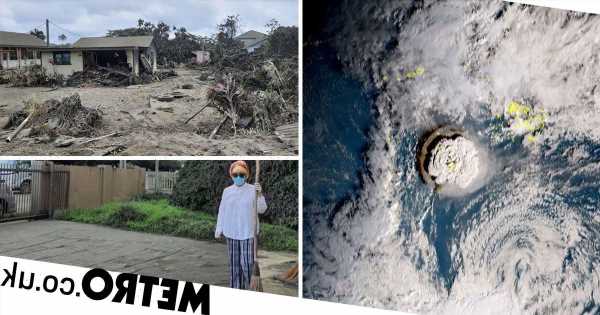Vanessa Heleta, who lives on Tongatapu in Tonga, first knew something was wrong when the birds in her garden started behaving strangely.
The executive director of the Talitha Project, which supports women and young people, lives just behind the main island’s royal palace in the capital of Nuku’alofa.
Vanessa lived through cyclone Gita which tore through Tonga in 2018 but said what happened on January 15 was ‘1,000 times scarier’.
At around 5pm she was on the phone to her mum, who lives in America, but was forced to cut the call short when she heard a loud bang.
‘The dogs started to bark non-stop around our area and then all of a sudden there was a big bang,’ she said.
Vanessa went to look out the window and could see a large cloud rising into the sky.
‘Everyone [was] running down to the sea and then I started seeing these big waves and that’s very unusual, because [the sea] is usually very calm,’ she said.
Within minutes the call to evacuate was being played out over loudspeakers and there was a second, louder explosion.
‘I had my [daughter and my nine-year-old niece with me at home] and I said to them: “Run, run, get your things, grab whatever you can, spare clothes or food” because all these people were running to the sea,’ Vanessa said.
‘All of a sudden there was the biggest eruption and then I can see all the kids were running back from the seafront because the waves [were] getting bigger.’
Grabbing whatever they could the family jumped in their car taking their dogs and elderly neighbour with them as they tried to get inland to higher ground.
Vanessa said they soon hit a long queue of others trying to do the same.
‘We started having this rain of little rocks, molten rocks started falling and then it became very dark and it looked like it was eight o’clock at night but was only six o’clock,’ she said.
‘So we were so scared, there was also thunderstorm, it was so scary.
‘All these rocks were falling, and then all of a sudden the ash started coming down and it just covered the windshield… so much ash was falling non-stop.
‘Everyone was panicking and people didn’t know where to go and animals were running beside us. So it was just very crazy.’
The following day Vanessa woke up to find Tonga covered in black ash and without power.
Not only did the ash pollute much of the island’s water supply, but it hampered rescue efforts and ruined food supplies.
‘We can’t eat anything from the sea right now,’ she said.
‘You have to remember that the volcano [was] not like a normal volcano. It was a blast underwater.
‘So the water is, you know, full of debris. So all the restaurants here, right now they don’t have any seafood, no seafood whatsoever, because we can’t eat it, it’s not safe.’
In the wake of the eruption, the Talitha Project has been helping women and young people recover.
Vanessa said the eruption had had a devasting effect on the nation and its people, who had been left traumatised.
‘It’s no use explaining [it to the media], because you have to experience it for yourself, and I never thought I would live to experience something like this in my life,’ she added.
‘When the cyclone happened, I was really scared but this explosion, [I was] more than 1000 times more scared.
‘I’m a very strong woman and you know, a leader and all that stuff but what happened on that day really, tested our level of resilience.’
Vanessa said the situation was particularly dire for those evacuated from Tonga’s smaller islands: ‘Financially, economically you know, their livelihood is gone and a lot of these people are too scared to go back because that island is completely flat.
‘They love the island, but they feel that they’re not safe to go back but at the same time, they don’t have any land here in Tongatapu.’
The Talitha Project
The Talitha Project, based in Tonga, was set up in 2009.
It supports women, and young people and is run by a team of 10 staff who work alongside volunteers and mentors.
The project runs a number of programs including several focused on sexual and reproductive health, gender-based violence, financial education and climate change and disaster preparedness.
It is also involved in getting women and girls into rugby.
Since the eruption of the Hunga-Tonga-Hung’apai volcano, the Talitha Project has focused its efforts on supporting young people affected by the disaster.
Its staff have been delivering art supplies and sports equipment to evacuation centres and talking to children to help them process what has happened.
Vanessa said while aid agencies had brought supplies to Tonga, the Talitha Project had concentrated on creative ways of helping children affected by the eruption.
‘We [have tried] to come up with a creative approach and a realistic approach because this is a big psychological problem for all of us,’ she said.
‘We visit the evacuation centre and they have absolutely nothing and you can see it on their faces, they are still shocked and traumatised.
‘We have to talk to them, we have to build rebuild their confidence because they’re scared.
‘So that’s what we have been doing right now and that’s what is needed right now in Tonga.’
Get in touch with our news team by emailing us at [email protected].
For more stories like this, check our news page.
Source: Read Full Article







